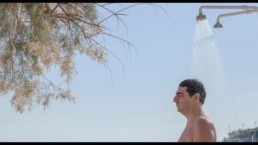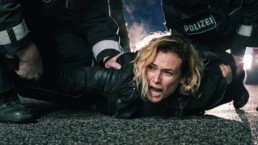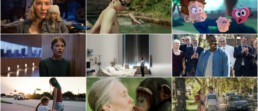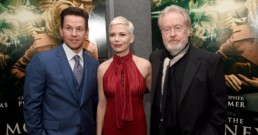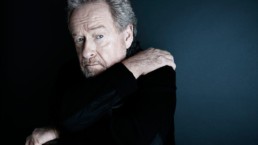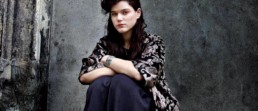Joel McHale, Emmy Rossum Talk 'A Futile and Stupid Gesture' [WATCH]
We catch up with director David Wain and actors Joel McHale, Emmy Rossum, Martin Mull, and Matt Walsh before the World Premiere of A Futile and Stupid Gesture at the 2018 Sundance Film Festival.
A Futile and Stupid Gesture is the story of comedy wunderkind Doug Kenney (played by Will Forte), who co-created the National Lampoon. Kenney was at the center of the 70’s comedy counter-culture which gave birth to Saturday Night Live and a whole generation's way of looking at the world. Now streaming on Netflix.
For our review of A Futile and Stupid Gesture, click here
'Pity' Sundance Review: The Only Thing Sad About This Film is That It Had To End
The day after I saw one of my favorite films in competition in the World Cinema Dramatic category– the Greek dark comedy, Pity– I saw the film’s director casually having a late breakfast at The Bridge Cafe in Park City.
The moment I recognized it was him was a euphoric one for many reasons– here was the man whose work I had become infatuated with a mere 24 hours earlier and considered one of the bests from the fest. Plus, it reminded me just how lucky the independent film community is to have a festival like Sundance, where creative energy bounces around Park City from artist to art lover, and audiences are introduced to films that otherwise may not end up on their radar. Pity is one of those films that I am so grateful to have seen in this environment.
Pity is Babis Makridis’ sophomore directorial feature film that tells the deliciously off-kilter story of a man who becomes dependent on the pity of strangers to give his life meaning. Actor Yannis Drakopoulos plays the unnamed man whose situation looks grim– his wife is in a coma and, with no apparent domestic skills of his own, has come to depend on his neighbor’s daily bundt cakes to feed himself and his son. It becomes apparent, however, that the food isn’t the only thing satiating his appetite, his neighbor’s constant care and concern also feeds his growing ego and desire for sadness. The man picks up his dry cleaning and tells the employee all about his life’s misfortune, and leaves with freshly pressed suits and a bountiful supply of sympathy. It isn’t until his wife begins to recover that the man realizes that he depends on the pity from strangers to continue living and will stop at nothing to ensure he receives it.
The situations are hilarious and horrifying all at once, the winning combination that makes every moment feel like a metaphorical punch in the gut... exactly the way our protagonist would like it.
This is not a case of schadenfreude– happiness at the misfortune of others– but a case of twisted and psychological self-sabotage. The man is only happy when he is sad, he is quite literally addicted to sadness, and that is what makes this Greek tragicomedy, whose tagline is “Stay Sad,” one of the most creative and smart films to hit the arthouse/dark comedy scene. Perhaps the best part of all is the understated execution of this wacky plot, which is attributed to Drakopoulos' deadpan performance and beautiful cinematography. Makridis and his DP Konstantinos Koukoulios create a visually stunning and engaging aesthetic that grounds this black comedy in reality, making the character's situation all the funnier because of its realness.
Makridis’ directorial accomplishments may not run long just yet, but he is no stranger to the film industry– just ask his Pity collaborator and co-writer Efthimis Filippou whose credits include The Killing of a Sacred Deer, The Lobster, and Dogtooth (all directed by the great Yorgos Lanthimos). If you’ve seen any of the previously mentioned films, expect that same tone (and soundtrack) to come across in Pity. The situations are hilarious and horrifying all at once, the winning combination that makes every moment feel like a metaphorical punch in the gut... exactly the way our protagonist would like it.
97 minutes. 'Pity' is not yet rated.
Sundance 2018, Here We Come!
Tomorrow marks the official start of the 2018 Sundance Film Festival, and Cinemacy is so excited to be returning to Park City, UT to cover the best of the fest from start to finish!
The weather predicts snow, and the lineup predicts over 100 innovative and groundbreaking independent films from all over the globe. Founded by Robert Redford in 1978, the Sundance Film Festival is a cultural tastemaking event that sets the tone for the coming year in indie film– some of last year’s notable gems that went on to box office and critical acclaim include Call Me By Your Name, The Big Sick, and Mudbound. And although the ink is not yet dry on Cinemacy’s film festival schedule– there are more events, panels, and performances to attend than there are hours in the day– we have narrowed down some of our most anticipated events.

Justice Ruth Bader Ginsburg
It is undeniable that female artists are shaping the film industry at this very moment, creating a platform and a call to action for equality and respect. The result is a major societal and revolutionary re-vamping of the system, and that is why this year, in particular, it feels extremely important to highlight the contributions and impact that women have made in cinema. It is with delighted anticipation that Sundance is hosting various discussions highlighting these current events with universally inspiring women, including Ava DuVernay, Justice Ruth Bader Ginsburg, Joan Jett, Octavia Spencer, and so many more. There will be conversations based on how storytellers transform not only the arts but society at large, and how the stories we tell will shape our future.

Brett Dennen
As a whole, the biggest draw of the festival may be the films, but Sundance also caters to the music-driven crowd with the inclusion of various pop-up performances and lounges. The ASCAP Music Café is a great place to re-group after spending the day in the snow or a theatre, and this year they are celebrating their 20th Anniversary with an impressive lineup. Brett Dennen and Ethan Gruska are just a couple of the artists set to perform, spotlighting music's essential role in the art of filmmaking. And in keeping with the theme of music, another scheduled event is the “Scoring for Sundance” panel, which gives the opportunity to hear from various composers as they discuss the art of music over a hot cup of coffee.

(L-R) Burden; I Think We're Alone Now; Don't Worry, He Won't Get Far on Foot
When all is said and done, however, it is the films that inspire us most. Out of 13,468 submissions, 110 feature-length films were selected to screen at this year’s festival. What is Cinemacy most looking forward to? For starters, covering master filmmaker Gus Van Sant’s drama Don’t Worry, He Won’t Get Far On Foot starring Joaquin Phoenix, Jonah Hill, and Rooney Mara; cinematographer-turned-director Reed Morano’s sci-fi feature I Think We’re Alone Now starring Peter Dinklage and Elle Fanning; and the sensitive drama, Burden starring Garrett Hedlund, Andrea Riseborough, and Forest Whitaker.
Follow Cinemacy along on our journey to Sundance and beyond on Instagram and Facebook to get an insider’s look at all the happenings at the 2018 Sundance Film Festival!
'In The Fade' Review: A Mother's Worst Nightmare is Realized and Relived
A mother's worst nightmare is realized and relived in the most devastating way in director Fatih Akin's suspenseful crime drama In The Fade.
Set on the unrelentingly cold streets of Hamburg, Germany, an unprovoked bombing by a pair of Neo-Nazis shatters Katja's world, leaving her widowed and childless in an instant. Nominated for a Golden Globe and Critic's Choice award among others, In The Fade is also German's official Oscar entry for Best Foreign Language Film.
The film begins with a simple title card: Family. Old home movies show a tattooed Katja (Diane Kruger) with her ex-con Kurdish-German husband Nuri (Numan Acar) as they say "I do" at their unconventional prison wedding (he served time for selling drugs). The footage shows a family that may be tough and hardened in appearance, but are very sweet and rich in love. Katja's life gets turned upside down in the most violent of ways when she discovers that her husband and their six-year-old son Rocco (Rafael Santana) were the only two deaths in a mysterious bombing which took place outside of Nuri's office. In between self-medication and nervous breakdowns, Katja believes she has a clue that could lead detectives to her family's murderers... if only somebody would listen.
The second chapter of the film reads: Justice. Court dates, testimonies, and false alibis force her to relive that day over and over again. As if that wasn't painful enough, the court's unsatisfactory ruling pushes Katja to the brink of losing it. She decides once and for all to take justice into her own hands when the system fails her. That leads up to the last chapter of the film: The Sea. The ocean is a universal sign of rebirth, but director Fatih Akin doesn't take this theme literally. In fact, the last chapter proves to be the strongest yet and makes In The Fade, as a whole, an incredibly powerful story.
In what is remarkably her first German-made movie, German-born actress Diane Kruger gives one of her strongest performances to date as Katja.
In what is remarkably her first German-made movie, German-born actress Diane Kruger gives one of her strongest performances to date as Katja. From the initial blood-curling scream of discovering her loved one's deaths to the eerily subdued conversations with Nuri's parents and picking out a child-sized casket with her sister, Kruger's performance as a grieving mother, in all of its stages, is a triumphant tour de force.
There are character similarities between Katja and All the Money in the World's Gail Getty, another memorable performance by actress Michelle Williams. The theme of a mother's relentless quest for answers and a fearless, "do whatever it takes" attitude makes her a heroine worth standing by and rooting for.
In The Fade is a challenging movie to sit through just based on its content, but it's beautifully composed cinematography and phenomenal performances make it the challenges worth it.
'In the Fade' is rated R for some disturbing images, drug use, and language including sexual references 106 minutes. Now playing at the Laemmle Royal with a national release to follow.
Morgan's Top 10 Films of 2017
The joke may be that 2017 has been a seemingly never-ending cycle of bad news and events, but it has also been a fantastic year for independent film. First-time directors Jordan Peele and Greta Gerwig made a splash with their feature debuts, more stories featuring LGBTQ representation were brought to the forefront, and unique storytelling all around has made this year one to remember. Below are the top ten films that I saw this year.

10. In a Heartbeat
Despite running just four minutes long, watching the animated short film In a Heartbeat became one of my favorite moments in film this year. The story of a young boy attempting to hide his feelings (literally, his heart) from another boy is at once full of innocence and yet also mature in its positive theme of self-acceptance. Directed by art school students Beth David and Esteban Bravo (it was their final project to graduate) and funded on Kickstarter, In a Heartbeat has already been met with much success, having been racked up 20 million views in its first five days since its official YouTube premiere. It's likely In a Heartbeat slipped through the cracks this year, but the good news is that you can still stream this winning short on YouTube in full for free.
Watch 'In a Heartbeat' in full on YouTube here.

9. Ingrid Goes West
In this age of social media, more and more studies are showing that an unhealthy attachment to social media can lead to depression and a false sense of reality. This is the premise of Matt Spicer's award-winning Sundance film Ingrid Goes West, a #nofilter look at modern-day superficiality in the digital age. Spicer's hilarious dark comedy is centered around the delusions of mentally unstable twenty-something, Ingrid (Aubrey Plaza), a social media stalker who confuses “likes” on Instagram for authentic relationships. So when she gets it in her head to make the beautiful social media influencer Taylor Sloane (Elizabeth Olsen) her BFF (best friend forever) IRL (in real life), Ingrid commits to doing whatever it takes, leading to a darkly perverse story and hilarious film that, while it may be a funny satire, may also make you re-consider posting that next photo to Instagram.
Read our full review of 'Ingrid Goes West' here.
Watch our full 'Ingrid Goes West' red carpet coverage from this year's LA Film Fest here.

8. Thelma
With films like 'Louder Than Bombs,' director Joachim Trier has shown he has a sensitive and artistic eye, which, lent to the seemingly ordinary story of a young woman coming of age, turns into something extraordinary. In his latest film, Thelma, Trier explores the tangle of repression, desire, and the supernatural through his main character, Thelma (Eili Harboe), a first-year university student who finds herself falling for a female classmate which, given her family's deeply religious background, imposes immediate feelings of confusion and shame upon her that manifest themselves into supernatural mayhem. Ruminating in silence and a sense of foreboding, Trier embodies the pursuit of love through this allegorical and psychological thriller, Trier has given us the true definition of a cinematic experience, which is also Norway’s official foreign-language Oscar submission.
Read our full review of 'Thelma' here.
Watch our full interview with Joachim Trier on 'Thelma' here.

7. Manifesto
Highly theatrical in its performance-driven style, Manifesto is a series of vignettes derived from famous 20th Century art movements in which Cate Blanchett stars in every role. Taking on thirteen different contemporary personas – from a homeless man, to choreographer, to anchorwoman – Blanchett and director Julian Rosefeldt modernize the manifestos of the past as well as show their lasting relevance in today’s world, making for an experimental tour-de-force of a film that blew me away. While on the surface it may seem like Manifesto only caters to niche “art house” enthusiasts, I can't recommend you taking a chance on exploring this unconventionally beautiful and stimulating work.
Read our full review of 'Manifesto' here.

6. The Killing of a Sacred Deer
Rejoining forces with Colin Farrell after The Lobster (my favorite film of 2016), Yorgos Lanthimos’ The Killing of a Sacred Deer is a destructive psychological thriller born out of revenge, showing just how easily any one person’s life can turn upside down and the desperate situations they'll go through to cope. Farrell plays a renowned cardiovascular surgeon who provides mentorship for young Martin (Barry Keoghan), an odd boy who shows interest in becoming a doctor. Martin’s intentions seem pure at first, but after a string of questionable acts, Steven begins to have reservations about their relationship. Only by that point, it’s too late. Lanthimos pulls no punches when it comes to creating graphic and unsettling visuals to dissect the complications in human relationships, and his latest film is no exception. Fantastical and darkly absurd, Sacred Deer is uncomfortably hilarious and will make you think about the sacrifices one will make under impossible circumstances.
Read our full review of 'The Killing of a Sacred Deer' here.

5. Lady Bird
The mother-daughter relationship can be a delicate dance, especially during those teenage years when it feels like the world and everyone in it is literally against you. If only you could move to New York, wouldn't that solve everything! For those of us who have lived through that phase (*raises hand), Greta Gerwig’s directorial debut, Lady Bird, is sure to strike a chord. Saoirse Ronan leads a cast of amazingly talented actors as she struggles to see eye to eye with her mother and vice versa – neither realizing their frustrations stem from the fact that they are exactly alike. This is a must-see for anyone who likes their humor playful, smart, and overall heart-warming.
Read our full review of 'Lady Bird' here.

4. Get Out
Written and directed by Jordan Peele (half of the former comedy duo "Key and Peele"), the satirical comedy Get Out is one of those rare films that is hard to shake long after its watch. Even over 10 months since I initially saw the film, I'm still fascinated by its bold theme and expert craftsmanship. Get Out tells the story of a young black man (Daniel Kaluuya) meeting his white girlfriend’s (Allison Williams) family for the first time, only to discover a hidden secret that threatens both his relationship and his life. With captivating performances and a smart script filled with hidden symbolism sprinkled throughout, Get Out is one that you'll want to re-visit many times over.
Read our full review of 'Get Out' here.

3. Jane
There may have been a number of films chronicling the life and times of Jane Goodall – who is most widely known for her study of chimpanzees and their behavior in the wild – but this is not just another nature documentary. In partnership with National Geographic, Jane is comprised fully of never-before-seen footage shot by notable wildlife photographer (and former husband) Hugo van Lawick during her assignment in Gombe, Tanzania in the 1960s. These special moments of Jane’s initial bonding with chimpanzees and the relationship she would develop with them over time are priceless and truly enchanting to watch on the big screen. With an original score by Philip Glass, Brett Morgen’s profile of Jane Goodall is a powerhouse film that sheds light on this incredible woman and serves as a reminder to stop and appreciate life’s beauty and natural wonders.
Read our full review of 'Jane' here.

2. Call Me By Your Name
Call Me By Your Name is the rare kind of big-screen adaptation that not only stays true to the details that made the novel so special, but improves upon them. Timothée Chalamet and Armie Hammer star as two acquaintances, turned friends, turned lovers, who navigate the confused feelings of desire for each other over one sunshine soaked summer in a 1980s Italian countryside. With a screenplay by James Ivory and directed by Luca Guadagnino, the story is beautifully sensual and lyrical, making for a romantic film that offers enough intimacy and devastation to capsize anyone. Newcomer Chalamet commands the film as teen Elio, whose journey of self-discovery and coming-of-age is one that bridges worlds in its emotional resonance and is already gathering awards and early Best Actor buzz.
Read our full review of 'Call Me By Your Name' here.

1. The Florida Project
Sean Baker's The Florida Project moved me in ways that I haven't been moved in a long time, making this “little indie that could” my favorite film of the year. Emotional, nostalgic, and captivating, this $2 million feature success from A24 is a result of the sum of its parts, most notably in the fantastic performances from its young star Brooklynn Prince and supporting anchor Willem Dafoe. The loose story follows six-year-old Moonee (Prince) as she lives with her teenage mother (Bria Vinaite) in a long-stay budget motel, plays with neighboring kids, and, due to certain circumstances, is quickly forced to grow up, all while being overshadowed by the blinding happiness of the neighboring Disney World. Life is complicated, beautiful and messy, and Baker captures that hard-to-describe energy in a short 111 minutes. It isn’t just the script that brought me to tears (although that happened more than once too), it is the raw, palpable energy in front of the lens from the film’s rising stars (especially that last scene, bring the tissues). The Florida Project offers a unique perspective on growing up and my feelings from that initial viewing have stayed with me to this day, and I'm certain they will with you too.
Read our full review of 'The Florida Project' here.
Michelle Williams, Christopher Plummer Answer Controversial Questions About 'All the Money in the World'
It's one of the most controversial films of the year and it hasn't even been released yet.
By now, everyone should be aware of the last minute casting shakeup that made All the Money in the World global news. Kevin Spacey, accused of various sexual assaults, was cut out of the film after it had already been shot, edited, and ready for screening at the AFI Film Festival just last month. In came Christopher Plummer, joining fellow actors Michelle Williams and Charlie Plummer (no relation), to take over the role of J. Paul Getty. In our interview with the trio, we talk about the stress of this absurdly quick turnaround, director Ridley Scott's unconventional on-set methods, and what it's like to have another Plummer on the acting scene.
For our interview with director Ridley Scott, screenwriter David Scarpa, and producer Bradley Thomas, click here.
Ridley impressed Christopher by doing this one thing.
Christopher Plummer, "J. Paul Getty": Ridley flew all the way from London to see me, unbelievable. Even if I didn't want to do [the movie] I would've done it just for that! For years I've wanted to work with Ridley- I'm not just saying that to get another job. Really, seriously, I admire his work. I probably would've done it even if I loathed the script. Ridley made me feel as confident and comfortable as possible, which he did miraculously- mostly because of his outrageous sense of humor. That will calm anybody down.
As a single mother herself, Michelle found this was the biggest challenge in playing Gail.
Michelle Williams, "Gail": The way that the script was conceived was of a woman who refuses to let herself fall apart, a woman who takes great effort to keep herself together because falling apart won't get any closer to the ultimate goal which is to have her son back. At times, that was the hardest thing to do- to stay as strong and steely as possible when confronted with these circumstances that are so wrenching. She has to go through so much in this movie; so much that's unfair, undue, and just shouldn't have been, and she's doing it essentially alone. She and Chase [Mark Wahlberg] form a certain partnership at some point but she is essentially taking all of these hurdles by herself.
This is how Michelle studied the mannerisms of Gail Getty.
Michelle Williams: There are only two or three clips of her online. Those clips would always put me right back into the pocket of how Gail carried herself, how she moved her mouth... I spent a lot of time working on them with a dialect coach, breaking apart the vowel sounds and understanding where that specific kind of speech pattern comes from. They meant a great deal to me.
"That was the hardest thing to do- to stay as strong and steely as possible when confronted with these circumstances that are so wrenching." -Michelle Williams
Charlie Plummer and Paul Getty have these two things in common.
Charlie Plummer, "J. Paul Getty III": At a young age, Paul had been surrounded by adults and around a lot of adult matters. That is something I can relate to, I've been acting since I was 12 and so I've had lots of conversations with adults. I also think the relationship with his mother is one that I can relate to, in some aspect.
Christoper is none too pleased there is another actor named 'Plummer.'
Christopher Plummer: I didn't know there was an actor named 'Charlie Plummer'... how dare there be. Laughter. Especially with the name 'Charlie.'
Haha, no but from the little I saw on the screen, he's absolutely super. Although I hate to say it. Laughter.
This is the only question Michelle would ask Gail Getty.
Michelle Williams: I would really only want to ask her what her [experience] was like.
The time crunch was a welcomed challenge.
Christopher Plummer: I thrived on it. If you love your profession, which I certainly do, you welcome challenges and stress more than anything else.
"If you love your profession, which I certainly do, you welcome challenges and stress more than anything else." -Christopher Plummer
A lot of the scenes in the film were the actor's first take.
Michelle Williams: Ridley was so great at putting me at ease and giving me the floor. I had never worked with someone who had given me so much freedom. He just opened up the space and said, 'This is yours, go be free.' That was intoxicating. So [Ridley] would say, 'Here's the space, I've got cameras in places I don't need to tell you about, why don't we rehearse on film?' That's a scary thing to do because nothing is finessed, nothing is smoothed out, it's all unknown. So we would do this thing that we called... rehearsing on film... and very often he would say, 'Ok great, I've got it, I'd like to move on.' And in the middle of rehearsing on film, he would throw a physical obstacle in your way that you couldn't have anticipated, so you would be dealing with something in real time and always in the back of my head a little smile went on in my brain, thinking 'God, what is he going to come up with next?' I would get so excited to come to work because it was like the stage, it was like being in a play where it's real, it's alive. So what you see in the movie, a lot of [the scenes] are our first take, which has a real aliveness to it. It was a really exciting workplace and I'm a little lost without it.
Christopher relied heavily on the script.
Christopher Plummer: I must congratulate the writing, I really did depend on David's wonderful script because I didn't have any preparation at all. There were so many rolling colors in the character as written that I knew it was more than just a monotonous monologue lasting page after page. There is an awful lot of value in [this character].
She doesn't see any similarity between Gail and her mother character in The Greatest Showman.
Michelle Williams: Gail Getty is very different from Charity Barnum. [Gail] required a lot more of me but I was ready for it, hungry for it. After the "couch time" that was Showman, I was ready to get back up on my feet and be driven hard again which is, what everyone here described, is what we live for. Still, after all this time, I'm just burning for the "unknown."
"At a young age, Paul had been surrounded by adults ... That is something I can relate to [because] I've been acting since I was 12." -Charlie Plummer

A natural bond formed between Paul and his captor.
Charlie Plummer: That was through speaking with Ridley at the beginning of the process and talking about how crucial that relationship was. My character spends five months in captivity, and [we talked about] how important it is to physically see what that does to a person, but also mentally. Being the only human connection Paul has for five months, naturally [a bond] will happen. Romaine also does such a phenomenal job of really bridging those two characters.
Makeup is a distraction, authenticity is key.
Christopher Plummer: In playing real people, you have to be as subtle as possible. If you try to make an imitation out of it you might as well wear a mask. You have to save something from inside you that can be revealed through the character that you're playing, otherwise, it is a cheap imitation.
'All the Money in the World' opens on Christmas Day.
Ridley Scott: "In 3 1/2 weeks, we went from zero to a Golden Globe"
Ridley Scott is a very busy man.
But that didn't stop him from re-shooting almost half of the scenes from the kidnapped Getty-heir drama All the Money in the World in the 11th hour. Out was the film's anchor, Kevin Spacey, and in was Christopher Plummer, who had just days to prepare and shoot his scenes as J. Paul Getty. For many in the unfortunate situation that Scott found himself in 3 1/2 short weeks ago, it's likely that no one could have pulled off this feat as seamlessly and controlled as Ridley- the 80-year-old legendary director- has done. As if we needed proof, Scott was recently nominated for his 5th Golden Globe. In our interview with the self-professed "stress lover," screenwriter David Scarpa, and producer Bradley Thomas, we talk casting Plummer, what he loves the most about stress, and how he uses one simple trick to connect with his actors. We begin:
Ridley left another project mid-stream to work on All the Money in the World.
Ridley Scott, director: I was mid-stream on a fairly large project when I got a call from Bradley [Thomas, producer] who said he would like to meet because [he and co-producer Dan Friedkin] wanted to work with me on something. I read everything myself, I don't have anyone read for me, [so] when I read the script, it hit me hard. It just sat there with me. I knew I was mid-stream with this other project so I said, 'Listen, we'll put that on hold and it will evolve later- I'm going to jump in and do this [All the Money in the World].'
This is the one thing about the Getty kidnapping that shocked the screenwriter.
David Scarpa, screenwriter: When I embarked on this, I was looking for a movie that was about money and the power that it has over everyone's lives- whether they be rich or poor, it drives the choices they make in life. I was already somewhat familiar with the Getty kidnapping because everybody knows the story of the ear... However, something I didn't already know was that J. Paul Getty was the richest man in the world at the time and refused to pay the ransom that would've been easy for him to pay. To me, that seemed like a Shakespearean jumping-off point for a story about a man who both loved his grandson yet was so addicted to money that he was incapable of parting with it.
Re-shoots started 3 1/2 weeks ago. Yes, you read that correctly: 3 1/2 weeks ago.
Bradley Thomas, producer: Keeping it a secret was very important. We were discussing the idea of doing this [reshoot], even though it seemed insane, but we were scared if it got out and we didn't pull it off, people would be [critical]. It could've hurt us. Keeping it a secret was the most important thing.
Ridley Scott, director: It's worth mentioning that this happened 3 1/2 weeks ago. Just to put things in perspective. Since then, we went to Italy, Rome... and now here we are. From zero to a Golden Globe.
"From zero to a Golden Globe."

Ridley Scott and Christopher Plummer. Courtesy of Tom Jamieson for The New York Times
Casting Christopher Plummer was fairly easy.
Ridley Scott, director: I met Christopher at the Four Seasons in New York. He said it sounded good but he needed to read it first. So he read it and the next day he said, 'Yes, why not?'
"Ridley Scott eats stress for breakfast."
Bradley Thomas, producer: I just read a quote that 'Ridley eats stress for breakfast.'
Ridley Scott, director: Haha. Stress, for me, is not working. I've never "worked" a day in my life. My job is not work, my job is my passion and my life. So I don't even think about [obstacles], I go Yipee, here's stress.
Ridley's cinematic eye is so perfect because of his gift of "natural geometry."
Ridley Scott, director: First of all, I had to protect Christopher from ever having seen what Kevin [Spacey] did because it has to be his. Christopher has to own it. Of course, I initially asked him if he wanted to see [the old footage] and he said, 'Absolutely not.' And so that was the right thing to do.
I was born with a natural geometry in my head, it's a gift for me which was polished doing years of commercials. I can shoot anything from any angle and, normally, what lands is- I hate to say perfect- but correct. It's right, and I wouldn't re-do it. The problem can be efficacy, I can turn a 9-day shoot into a 22-day shoot if I'm being inefficient, but I feel like all the scenes already worked geographically and choreographically so well. Why change that?
I've never "worked" a day in my life. My job is not work, my job is my passion and my life.

Ridley Scott on set of 'Exodus: Gods and Kings.' Courtesy of We Geek Girls.
Authenticity is the most important element in any fact or fiction work.
Ridley Scott, director: I did it with Black Hawk Down, which was chaos. It was a pocket edition of the chaotic stupidity of battle. Whether your story is fiction or fact, you have to be true to your story. The great thing about fiction is, if it feels like fact, it's stronger.
His upbringing as a concrete-layer shaped Ridley's work ethic.
Ridley Scott, director: The script says it- there's a great scene with Getty (the gun cleaning scene) where we get inside Getty's soul and he professes what money can do. He's seen it destroy men, families, and most importantly it destroys the children. You talk about the abyss of wealth which, in a similar way, is the abyss of poverty, like 'I'd much rather die in the back of a Rolls Royce than some garbage can somewhere.' By the way- I grew up as a concrete-layer, I did not come from a wealthy background. But my dad made me work, every Sunday. We worked Christmas, during the summer... I had to have pocket money. What I learned was that there was no way I was going to have that job [for the rest of my life].
The budget for All the Money in the World wasn't too extravagant... only less than $60 million.
Ridley Scott, director: For the scale of the movie and the scale of the story, this was a slightly expensive movie. Laughter. It wasn't a low-budget movie... but it was below $60 [million]. But I am very respectful of Dan and Bradley [producer] wanting to keep the budget as tight as possible. I'm very economical, I always end up slightly below budget. It becomes an internal competition for me- 'Do I need 100 cars? No. Do I need 10 cars? Yes, but 5 will do.'
"I like that unevenness. I like the ship moving all the time."

Ridley Scott and Mark Wahlberg. Courtesy of Twitter.
Ridley's powerful secret to connecting with actors is actually, quite simple.
Ridley Scott, director: I came into directing without going through drama school or film school. I was thrown into the deep end after being asked to do a live hour-long drama on TV. The training was, 'Here's your script, here's your office, here's your P.A., you're on in three weeks.' I got beaten up so often by actors- the worst was when they went silent and just rolled their eyes because I didn't know what to say to them. After a while, I began to design and devise my own method and what I discovered the most powerful thing to do is to make a partnership with the actor you're working with. Frequently, when I meet with an actor that I haven't necessarily given the role to, I'll chat with them about anything other than the film. I'll talk about bullshit. Suddenly, they're talking and relaxing and usually they start to leak into the story. Then you enter and from that moment on, you're their best friend. So my job is to be the actor's best friend and make them feel absolutely secure.
Ridley Scott thrives on the unknown.
Ridley Scott, director: Doing my job, like most people at this table, is a minute-by-minute process of things changing all the time. Sometimes it's important, sometimes it's just par for the course. I like that unevenness, I like the ship moving all the time. That feeds my stress. There is positive stress and negative stress. Negative stress is doing nothing, being unemployed- that's the worst stress you can possibly feel. Being over-employed is what I call positive stress. [The pleasure of telling stories] is the unknown.
'All the Money in the World' opens in theaters on Christmas Day.
Soko: "I always think of life and death and legacy and what you leave behind"
Paris is a city known for cultivating innovative minds and inspiring artistic souls.
It comes as no surprise, then, that this is where the pioneer of modern dance Loïe Fuller found her calling, and the actress that portrays her, Soko, calls home. Earlier this week, I had the opportunity to talk with the French musician/actress/artist/L.A. transplant about the process of getting into character in The Dancer, what she does (or doesn't) think about while performing, and the meaning behind her name. We begin:
Babysitting was her first job.
My first job was a babysitter when I was 13 or 14. Over the summer I would just take care of my neighbor's kids, take them to the beach. But I've known that I wanted to act since I was five. I knew that before I started making money with other things, haha.
She doesn't think about the audience while performing.
[When I'm performing] I don't think of anything but the story, what I have to do in the scene, and connecting with the director. You're telling the story- it doesn't involve people you don't know. It only involves whatever and whoever you're working with.

The meaning of her name is extremely powerful.
[Soko] is not a stage name for me. Soko was my dad's nickname and when he died, I was five, I felt like if I heard his name all the time then he would never "die" and I would always remember him. That just became my name. That is my complete identity and part of why I make art is because I always think of life and death and legacy and what you leave behind. With Loïe [her stage name], I guess she felt like she wanted to start over and be someone else, not the farm girl Marie Louise Fuller, but the star she always dreamt she'd be.
Training for seven hours a day made it hard for her to put her socks on in the morning.
This film was all risks and challenges, there was nothing that wasn't a risk or challenge about playing Loïe. She had been copied and imitated her whole entire life, and so it was a huge challenge for me to give the truest performance that is the most her. It was showcasing everything, like how she came up with [the dance] and how hard she trained, and how emotional it was for her and how many sacrifices she had to make in her personal life. To be able to give the truest performance, I had to just do it- which means training seven hours a day. Which means knowing what it feels like in your body after training seven hours a day, looking at your bruises, feeling achy, and not being able to put your own socks on in the morning because that means you'd have to warm up haha. All of this, you can't cheat it. There is no way of "acting around" it.
All of these things were a part of understanding Loïe. Knowing what it feels like to get dizzy after doing her dance, and dancing in the dark on the tiniest platform with lights blinding you! These are very real sensations that, unless you do the work, you don't know. I hope I'm giving a real portrait of an artist and show that if you're passionate and you love something, you devote your entire life to it.

Gaspard Ulliel, Melanie Thierry, Lily-Rose Depp, Soko and Stephanie Di Giusto at the 69th Cannes Film Festival. Photo by Aurore Marechal/ABACAPRESS.COM
Even though it is a biopic, the role of Loïe was written exclusively for Soko.
Director Stéphanie Di Giusto and I have been friends for 10 years now. It took her seven years to write the movie for me, so I was part of the entire process. I helped with casting, every bit of it I was there with her. It's a wonderful relationship and incredible collaboration because I inspired her to write the movie and she changed a lot of things for me. I witnessed Stéphanie become a feature film director. She started out making music videos and commercials and I witnessed her become who she truly wanted to be. She was like Loïe [in that way].
Soko relates to Loïe's struggle.
There were some traits that were similar between myself and Loïe, like feeling isolated and being hard on yourself. She was also a multi-hyphenate, like me. I don't like doing just one thing. I like making my merch, doing my artwork, directing my videos, making music, writing, performing, acting... I like doing it all. I'm hyperactive and need things to constantly keep me focused and inspired and challenged. Same with Loïe, you know? I felt very lucky that, by playing someone else, I could bring it back to myself knowing that I'm not alone in the struggle of putting my entire energy into something.

Determination is her strong suit.
You're not anywhere by yourself. I've just always had the biggest drive, and it comes really naturally. I don't force it, I really want to do all of these things. No one is trying to make me do something other than myself. Obviously, I have a great team– an amazing publicist and manager (that took a really long time to find). My label is amazing too, they've been helping me a lot. Acting wise, I've been really lucky that strong and powerful women come to me with a script and ask if I want to be the lead in their next film. Weirdly enough, they're always women directors with one thing in common– their strength, determination, and ambition.


